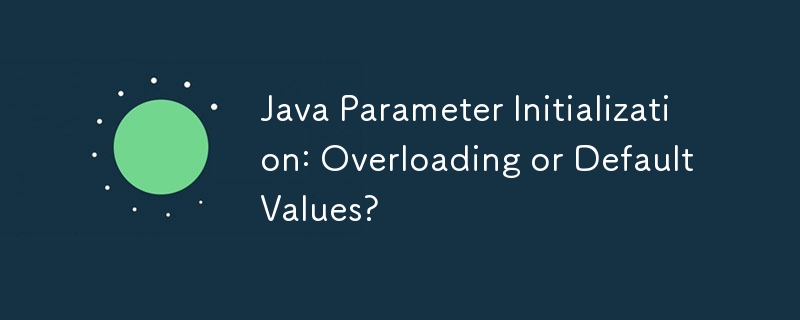Home >Java >javaTutorial >Java Parameter Initialization: Overloading or Default Values?
Java Parameter Initialization: Overloading or Default Values?
- Patricia ArquetteOriginal
- 2024-12-17 15:38:16682browse

Java's Approach to Parameter Initialization: Overloading vs. Default Values
Unlike C , Java does not provide direct support for assigning default values to parameters. Instead, it employs a technique known as method overloading to achieve a similar effect.
Overloading Mechanism:
In Java, if multiple methods share the same name but differ in their parameter lists, they are said to be overloaded. When calling such a method, the Java Virtual Machine selects the most appropriate method based on the number and data types of the arguments passed.
Applying Overloading to Parameters:
The Java code example provided demonstrates the use of overloading to initialize parameters with default values:
public MyParameterizedFunction(String param1, int param2) {
this(param1, param2, false);
}
public MyParameterizedFunction(String param1, int param2, boolean param3) {
// Use all three parameters here
}
In this code, two overloaded constructors are defined for the MyParameterizedFunction class. The first constructor takes two parameters, param1 and param2, and invokes the second constructor with an additional parameter, param3, set to a default value of false.
Reasons for Preferring Overloading:
There are several reasons why Java opted for overloading instead of default parameter values:
- Code Clarity: Overloading makes it explicit which parameters are optional and which are required, improving code readability and avoiding potential confusion.
- Flexibility: Overloading allows for greater flexibility in specifying default values, as it can be used to provide default values for multiple parameters or even apply different default values based on the parameter order.
- Performance Considerations: In some scenarios, overloading can result in improved performance compared to using default parameter values.
The above is the detailed content of Java Parameter Initialization: Overloading or Default Values?. For more information, please follow other related articles on the PHP Chinese website!

